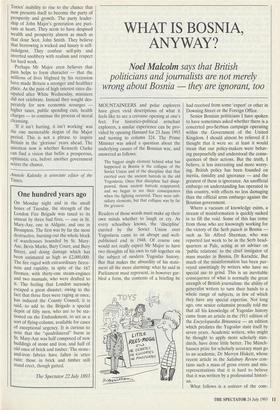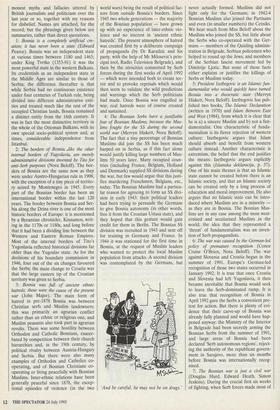WHAT IS BOSNIA, ANYWAY?
Noel Malcolm says that British
politicians and journalists are not merely wrong about Bosnia — they are ignorant, too
MOUNTAINEERS and polar explorers have given vivid descriptions of what it feels like to see a crevasse opening at one's feet. For historico-political armchair explorers, a similar experience can be pro- vided by opening Hansard for 23 June 1993 and turning to column 324. The Prime Minister was asked a question about the underlying causes of the Bosnian war, and answered as follows:
The biggest single element behind what has happened in Bosnia is the collapse of the Soviet Union and of the discipline that that exerted over the ancient hatreds in the old Yugoslavia. Once that discipline had disap- peared, those ancient hatreds reappeared, and we began to see their consequences when the fighting occurred. There were sub- sidiary elements, but that collapse was by far the greatest.
Readers of those words must make up their own minds whether to laugh or cry. As every schoolboy knows, the 'discipline' exerted by the Soviet Union over Yugoslavia came to an abrupt and well- publicised end in 1948. Of course one would not really expect Mr Major to have two thoughts of his own to rub together on the subject of modern Yugoslav history. But that makes the absurdity of his state- ment all the more alarming: what he said in Parliament must represent, in however gar- bled a form, the contents of a briefing he had received from some 'expert' or other in Downing Street or the Foreign Office.
Senior Bosnian politicians I have spoken to have sometimes asked whether there is a concerted pro-Serbian campaign operating within the Government of the United Kingdom. I should almost be relieved if I thought that it were so: at least it would mean that our policy-makers were behav- ing purposefully and understood the conse- quences of their actions. But the truth, I believe, is less interesting and more worry- ing. British policy has been founded on inertia, timidity and ignorance — and the greatest of these is ignorance. An unofficial embargo on understanding has operated in this country, with effects no less damaging than the official arms embargo against the Bosnian government.
Where a vacuum of knowledge exists, a stream of misinformation is quickly sucked in to fill the void. Some of this has come from those who are knowingly working for the victory of the Serb putsch in Bosnia such as Sir Alfred Sherman, who was reported last week to be in the Serb head- quarters at Pale, acting as an adviser on `public relations' to the chief instigator of mass murder in Bosnia, Dr Karadzic. But much of the misinformation has been pur- veyed unwittingly by writers who have no special axe to grind. This is an inevitable consequence of what is normally the great strength of British journalism: the ability of generalist writers to turn their hands to a whole range of subjects, in few of which they have any special expertise. Not long ago, one senior columnist proudly told me that all his knowledge of Yugoslav history came from an article in the 1911 edition of the Encyclopaedia Britannica — an edition which predates the Yugoslav state itself by seven years. Academic writers, who might be thought to apply more scholarly stan- dards, have done little better. The MOnch- hausen prize for scholarly accuracy must go to an academic, Dr Mervyn Hiskett, whose recent article in the Salisbury Review con- tains such a mass of gross errors and mis- representations that it is hard to believe that it was written by a professional histori- an.
What follows is a sottisier of the corn- monest myths and fallacies uttered by British journalists and politicians over the last year or so, together with my reasons for disbelief. Names are attached, for the record; but the phrasings given below are summaries, rather than direct quotations.
1: Bosnia is a completely artificial cre- ation; it has never been a state (Edward Pearce). Bosnia was an independent state at various times between 1180 and 1463; under King Tvrtko (1353-91) it was the most powerful state in the western Balkans. Its credentials as an independent state in the Middle Ages are similar to those of Serbia; the difference thereafter is that while Serbia had no continuous existence under four centuries of Turkish rule, being divided into different administrative enti- ties and treated much like the rest of the occupied Christian lands, Bosnia remained a distinct entity from the 16th century. It was in fact the most distinctive territory in the whole of the Ottoman Balkans, with its own special socio-political system and, at times, considerable independence from Istanbul.
2: The borders of Bosnia. .like the other internal borders of Yugoslavia, are merely administrative divisions invented by Tito for anti-Serb purposes (Nora Beloff). The bor- ders of Bosnia are the same now as they were under Austro-Hungarian rule in 1908, with the exception of a tiny piece of territo- ry seized by Montenegro in 1945. Every part of the Bosnian border has been an international border within the last 120 years. The border between Bosnia and Ser- bia along the Drina river is one of the most historic borders of Europe: it is mentioned by a Byzantine chronicler, Kinnamos, writ- ing in the 1170s or 1180s, and long before that it had been a dividing line between the Western and Eastern Roman Empires. Most of the internal borders of Tito's Yugoslavia reflected historical divisions far older than the Yugoslav state. As for the decisions of his boundary commission in 1946, four out of the six changes favoured the Serbs; the main change to Croatia was that the large eastern tip of the Croatian territory was given to Serbia.
3: Bosnia was full of ancient ethnic hatreds; these were the cause of the present war (John Major). The main form of hatred in pre-1878 Bosnia was between Christian serfs and Muslim landowners: this was primarily an agrarian conflict rather than an ethnic or religious one, and Muslim peasants also took part in agrarian revolts. There was some hostility between Orthodox and Catholic Bosnians, exacer- bated by competition between their church hierarchies and, in the 19th century, by political rivalry between Austria-Hungary and Serbia. But there were also many examples of Orthodox and Catholics co- operating, and of Bosnian Christians co- operating or living peacefully with Bosnian Muslims. Inter-ethnic relations have been generally peaceful since 1878, the excep- tional episodes of violence (in the two world wars) being the result of political fac- tors from outside Bosnia's borders. Since 1945 two whole generations — the majority of the Bosnian population — have grown up with no experience of inter-ethnic vio- lence and no interest in 'ancient ethnic hatreds'. The present atmosphere of hatred was created first by a deliberate campaign of propaganda (by Dr Karadzic and his party, with the help of Mr Milosevic's prin- cipal tool, Radio Television Belgrade), and then by the atrocities committed by Serb forces during the first weeks of April 1992 — which were intended both to create ter- ror and to provoke reprisals which would then seem to validate the wild predictions and warnings which the Serb politicians had made. Once Bosnia was engulfed in war, real hatreds were of course created and sustained.
4: The Bosnian Serbs have a justifiable fear of Bosnian Muslims, because the Mus- lims fought for the SS during the second world war (Mervyn Hiskett, Nora Beloff). The fact that a tiny percentage of Bosnian Muslims did join the SS has been much harped on in Serbia, as if this fact alone would justify killing large numbers of Mus- lims 50 years later. Many occupied coun- tries (including France, Belgium, Holland and Denmark) supplied SS divisions during the war, but few would argue that this justi- fies murdering Frenchmen, Belgians, etc., today. The Bosnian Muslims had a particu- lar reason for agreeing to form an SS divi- sion in early 1943: their political leaders had been trying to persuade the Germans to give Bosnia autonomy (in other words, free it from the Croatian Ustasa state), and they hoped that this gesture would gain credit for them in Berlin. The Bosnian SS division was recruited in 1943 and sent off for training in Germany and France. In 1944 it was stationed for the first time in Bosnia, at the request of Muslim leaders who wanted to protect the local Muslim population from attacks. A second division was contemplated by the Germans, but `And be careful, he may not be on drugs.' never actually formed. Muslims did not fight only for the Germans; in 1942-4 Bosnian Muslims also joined the Partisans and even (in smaller numbers) the Cetniks. We hear much from Miss Beloff about the Muslims who joined the SS, but little about the Serbs who co-operated with the Ger- mans — members of the Quisling adminis- tration in Belgrade, Serbian policemen who helped to round up the Jews, and members of the Serbian fascist movement led by Dimitrije Ljotic. But none of these facts either explains or justifies the killings of Serbs or Muslims today.
5: President Izetbegovic is an Islamic fun- damentalist who would quickly have turned Bosnia into a theocratic state (Mervyn Hiskett, Nora Beloff). Izetbegovic has pub- lished two books, The Islamic Declaration (written in 1970) and Islam Between East and West (1984), from which it is clear that he is a) a sincere Muslim and b) not a fun- damentalist. One characteristic of funda- mentalism is its fierce rejection of western culture: Izetbegovic argues that Islam should absorb and benefit from western culture instead. Another characteristic is extremism, the belief that the end justifies the means: Izetbegovic argues explicitly against this (Islamska deklaraczja, p. 37). One of his main themes is that an Islamic state cannot be created before there is an Islamic society, and that an Islamic society can be created only by a long process of education and moral improvement. He also argues that no Islamic state can be intro- duced where Muslims are in a minority as they are in Bosnia. The Bosnian Mus- lims are in any case among the most west- ernised and secularised Muslims in the world; the idea that they represented a `threat' of fundamentalism was an inven- tion of Serb propagandists.
6: The war was caused by the German-led policy of premature recognition (Conor Cruise O'Brien, Nora Beloff). The war against Slovenia and Croatia began in the summer of 1991. Europe's German-led recognition of those two states occurred in January 1992. It is true that once Croatia and Slovenia had left Yugoslavia, it then became inevitable that Bosnia would seek to leave the Serb-dominated rump. It is also true that recognition of Bosnia in April 1992 gave the Serbs a convenient pre- text for action. But there is plenty of evi- dence that their carve-up of Bosnia was already fully planned and would have hap- pened anyway: the Ministry of the Interior in Belgrade had been secretly arming the Bosnian Serbs from the summer of 1991, and large areas of Bosnia had been declared 'Serb autonomous regions', reject- ing the authority of the republican govern- ment in Sarajevo, more than six months before Bosnia was internationally recog- nised.
7: The Bosnian war is just a civil war (Douglas Hurd, Edward Heath, Simon Jenkins). During the crucial first six weeks of fighting, when Serb forces made most of their territorial gains, the main fighting forces were units of the Yugoslav federal army, acting under orders from Belgrade, and Serb paramilitary units (Arkan's `Tigers', etc.), which had been formed out- side Bosnia. In mid-May 1992 the federal army in Bosnia was renamed, for largely cosmetic purposes, the army of the 'Ser- bian Republic in Bosnia'; it continued to be supplied from Serbia, supplemented by manpower from Serbia and Montenegro, and politically directed from Belgrade. A war planned, supplied and directed by Ser- bia, with the ultimate aim of detaching ter- ritory from Bosnia and joining it to Serbia, is not just a Bosnian civil war. During the last four months the fighting has become more like a real civil war, with violence between Bosnian Croats and Muslims too: this is a direct result of the Vance-Owen `peace process' (which stirred up competi- tion for territory between those two former allies), a process praised by Messrs Hurd and Jenkins.
8: It is all Izetbegovic's fault: an agreement was made in March 1992 to divide Bosnia into three ethnic units, but he then repudiated the deal (Nora Beloff). No deal was repudi- ated, because no deal was made. The EEC- sponsored proposal (which originated from the Serbs) was simply accepted as a basis for further discussion. Then, as the Serbian newspaper Borba reported at the time, the proposal was rejected, first by the Croat delegation on 24 March, and by Mr Izetbe- govic's party on the following day.
9: The Serbs owned 64 per cent of the land in Bosnia, so cannot accept any plan which gives them as little as 44 per cent of Bosnian territory (John Zametica). This is an absurd argument: it is not comparing like with like. The Serbs (31.3 per cent of the population) were a more rural people, and did own more plots of farmland. But most of Bosnia consists of mountains and forests, which were not owned by any individuals.
10: Apart from its humanitarian aid, the West has pursued a policy of non-interven- tion (Simon Jenkins). The arms embargo, which has had little effect on the well- stocked Serb forces but a huge effect on the Bosnian army, has been a massive form of intervention in the conflict. It has become one of the most important factors determining the military outcome. The Serbs made most of their initial gains in the early weeks of fighting, using the advan- tages of planning, surprise and overwhelm- ing force. Thereafter, once the Bosnian army began to be organised, the Serbs were held to a virtual stalemate for the rest of 1992, and in some areas (e.g., Brcko and Bratunac) pushed back. The main reason why the Bosnian army began losing territo- ry in early 1993 was the lack of weapons and ammunition. Thousands of civilians in eastern Bosnia have died because this army was unable to defend them. Imposing an embargo and calling it non-intervention is the policy once described by Tacitus: 'They make a wilderness, and call it peace.'




















































 Previous page
Previous page